牛津上海版英语Module 1 RelationshipsUnit 2 Our animal friends (课件38张)
文档属性
| 名称 | 牛津上海版英语Module 1 RelationshipsUnit 2 Our animal friends (课件38张) |
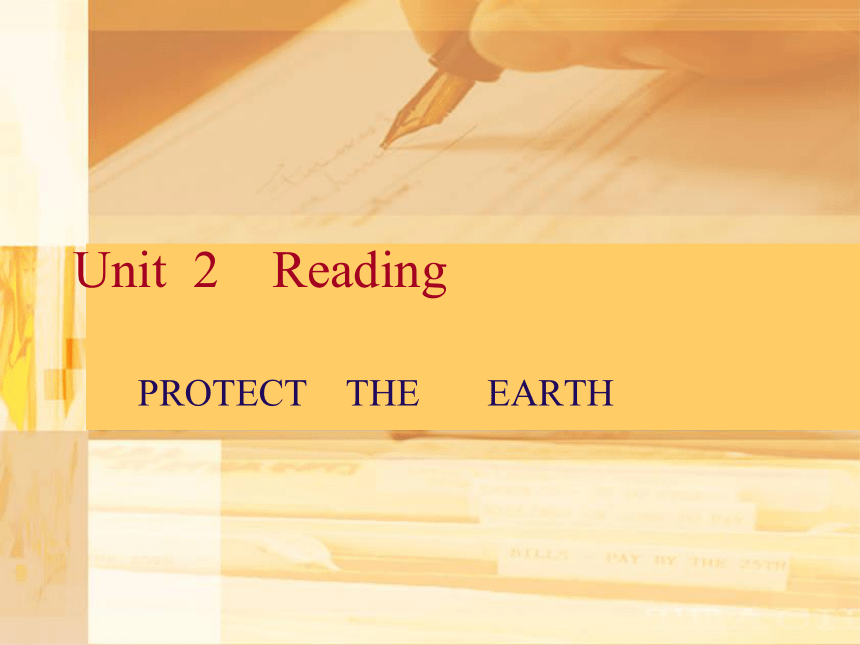
|
|
| 格式 | zip | ||
| 文件大小 | 347.5KB | ||
| 资源类型 | 教案 | ||
| 版本资源 | 牛津上海版(试用本) | ||
| 科目 | 英语 | ||
| 更新时间 | 2019-12-01 11:24:17 | ||
图片预览


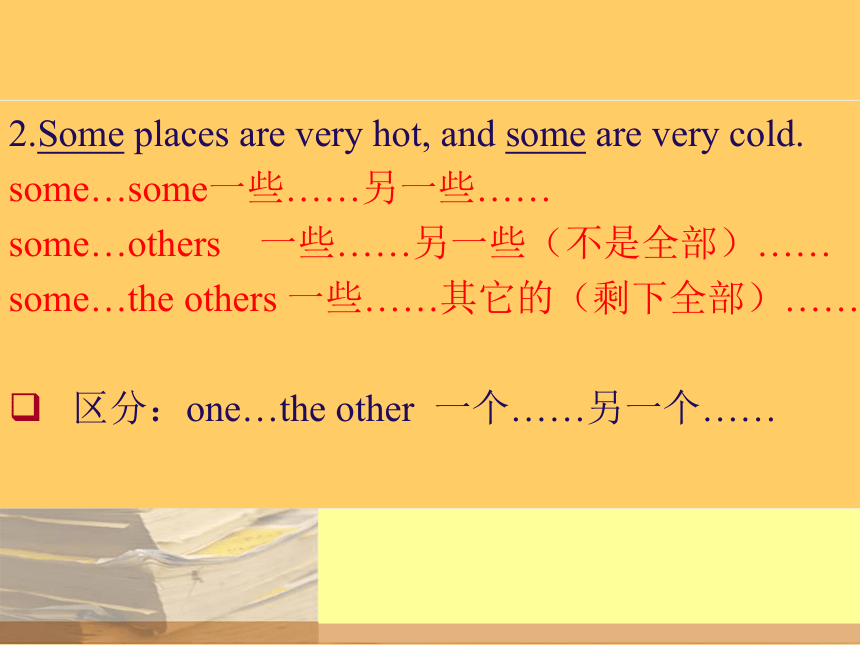
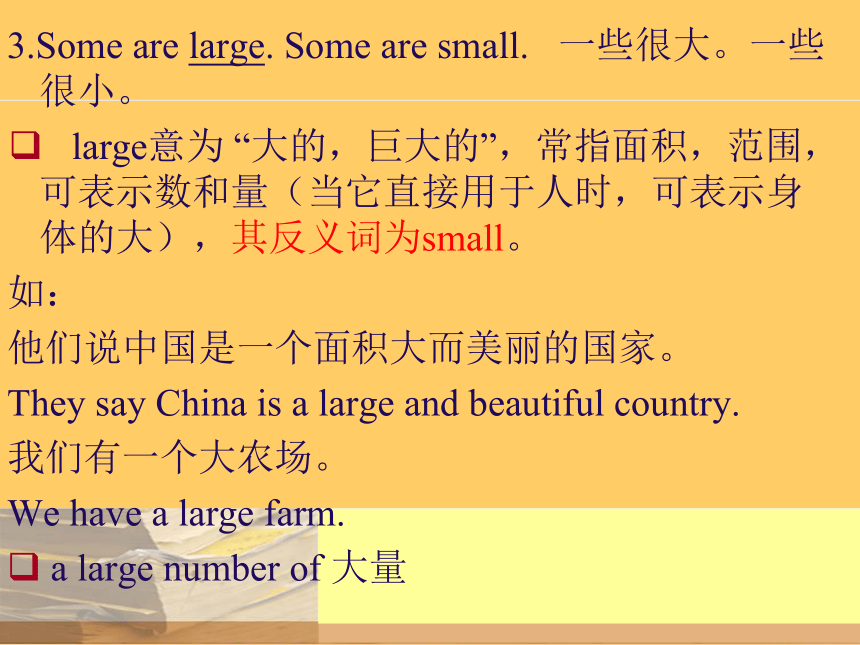
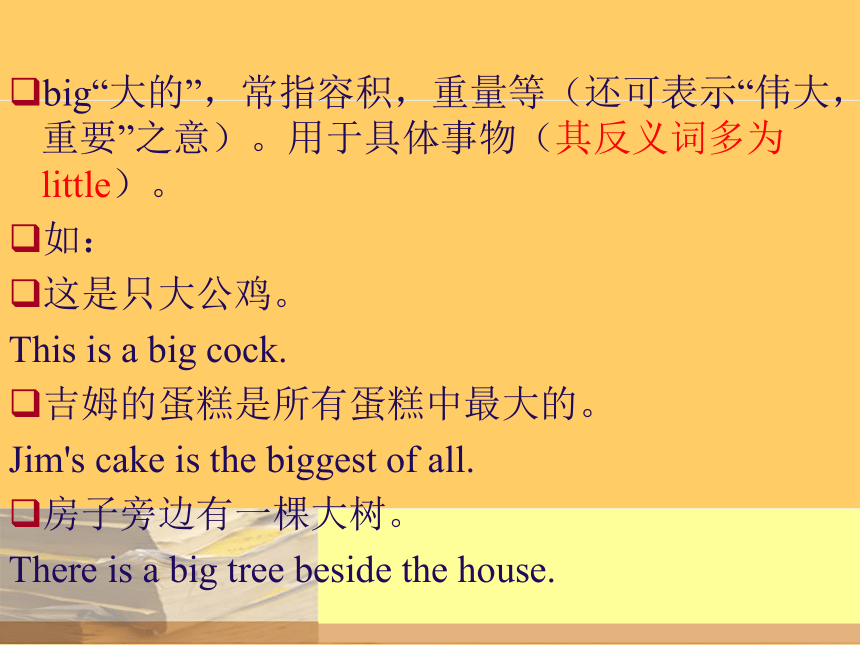
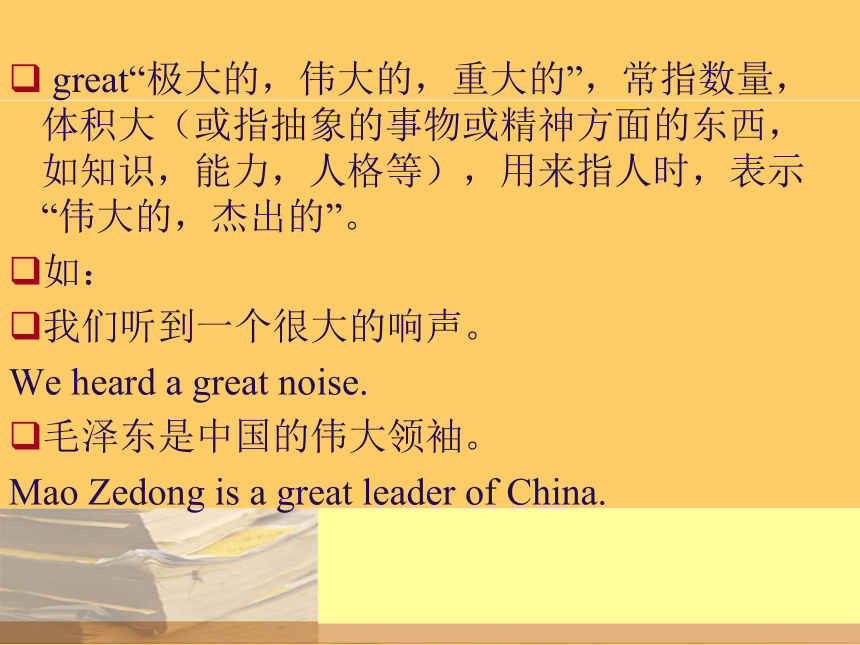

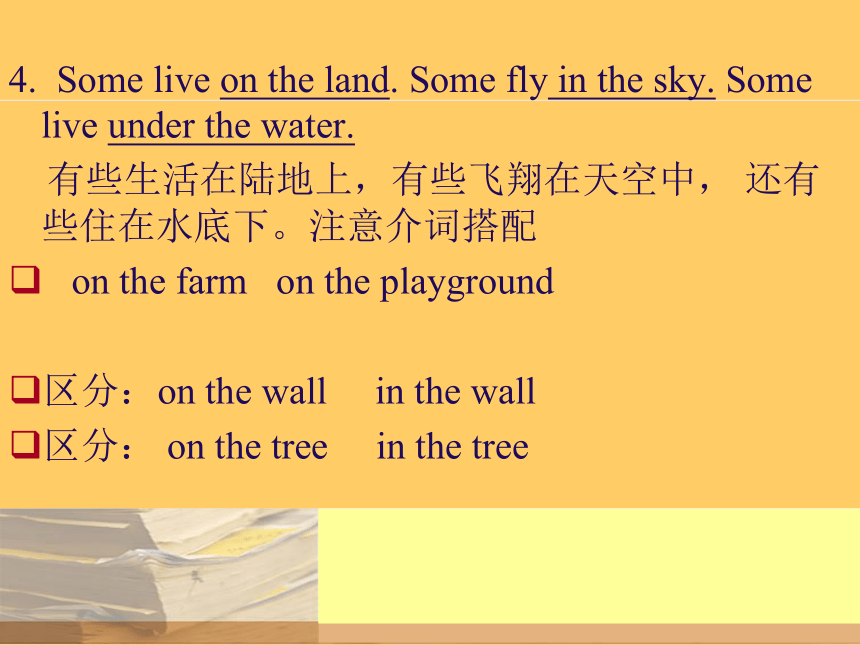
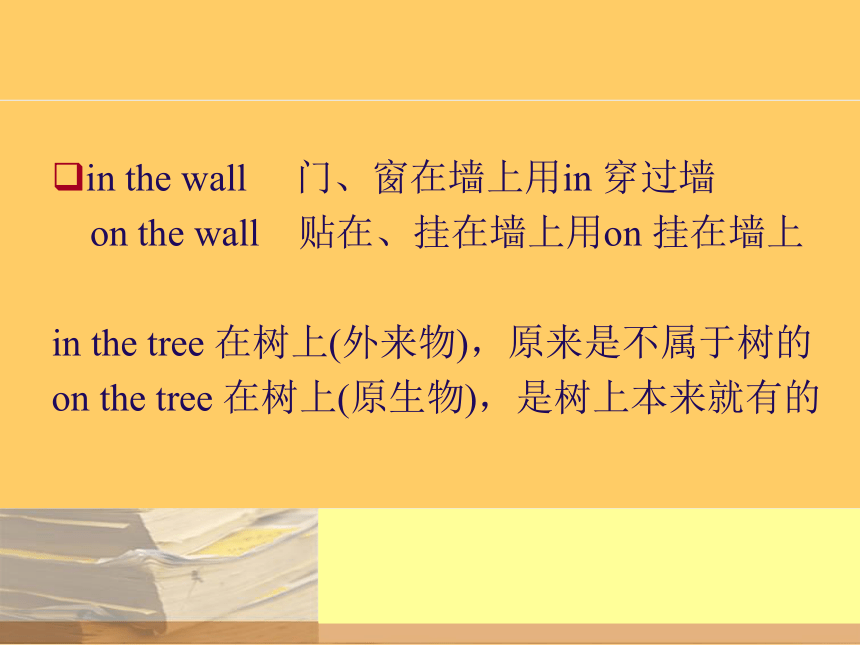
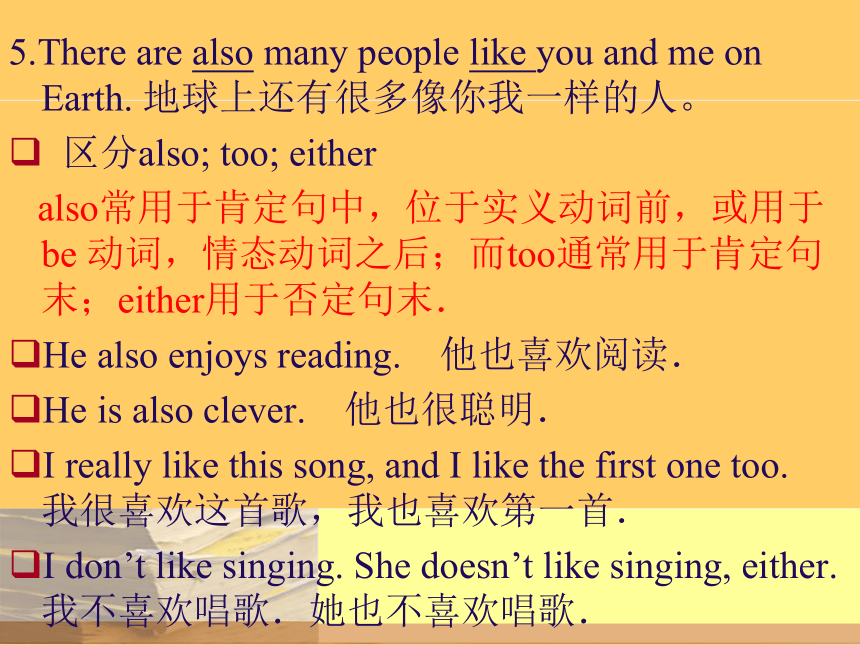
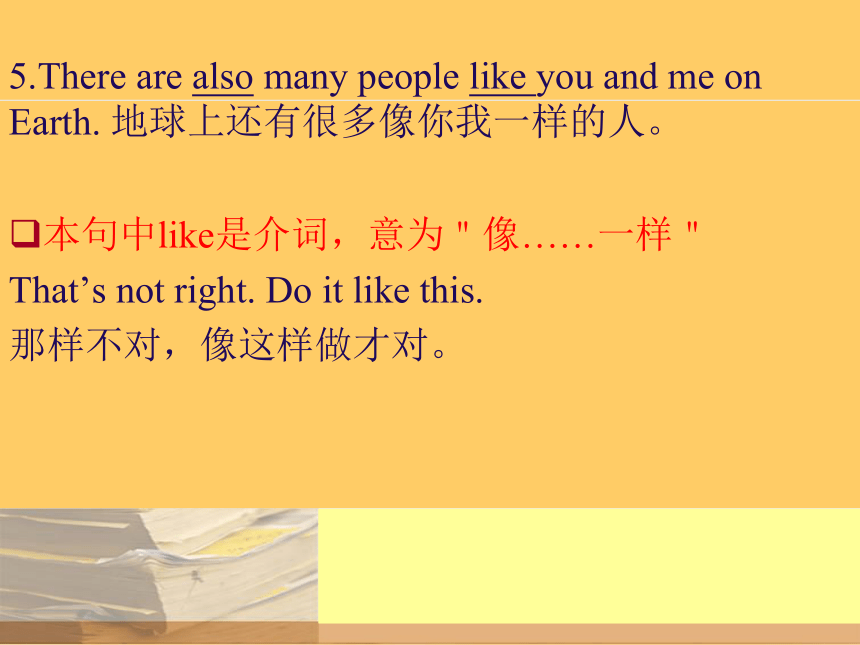

文档简介
(共38张PPT)
Unit 2 Reading
PROTECT THE EARTH
1.There are forests and rivers, mountains and fields. 有森林、河流、高山和田野。
field此处是可数名词,意为“田野;田地”
work in the fields在田里干活
a football field一个足球场
the field of science科学领域
2.Some places are very hot, and some are very cold.
some…some一些……另一些……
some…others 一些……另一些(不是全部)……
some…the others 一些……其它的(剩下全部)……
区分:one…the other 一个……另一个……
3.Some are large. Some are small. 一些很大。一些很小。
large意为 “大的,巨大的”,常指面积,范围,可表示数和量(当它直接用于人时,可表示身体的大),其反义词为small。
如:
他们说中国是一个面积大而美丽的国家。
They say China is a large and beautiful country.
我们有一个大农场。
We have a large farm.
a large number of 大量
big“大的”,常指容积,重量等(还可表示“伟大,重要”之意)。用于具体事物(其反义词多为little)。
如:
这是只大公鸡。
This is a big cock.
吉姆的蛋糕是所有蛋糕中最大的。
Jim's cake is the biggest of all.
房子旁边有一棵大树。
There is a big tree beside the house.
great“极大的,伟大的,重大的”,常指数量,体积大(或指抽象的事物或精神方面的东西,如知识,能力,人格等),用来指人时,表示“伟大的,杰出的”。
如:
我们听到一个很大的响声。
We heard a great noise.
毛泽东是中国的伟大领袖。
Mao Zedong is a great leader of China.
区分:
China is a large country. 强调面积
China a big country. 强调实力
China is a great country. 强调伟大
a large box一个大箱子(强调体积大,不一定重)
a big box一个大箱子(强调不仅大,而且重)
a large person大个子
a great person伟人,大人物
4. Some live on the land. Some fly in the sky. Some live under the water.
有些生活在陆地上,有些飞翔在天空中, 还有些住在水底下。注意介词搭配
on the farm on the playground
区分:on the wall in the wall
区分: on the tree in the tree
in the wall 门、窗在墙上用in 穿过墙
on the wall 贴在、挂在墙上用on 挂在墙上
in the tree 在树上(外来物),原来是不属于树的
on the tree 在树上(原生物),是树上本来就有的
5.There are also many people like you and me on Earth. 地球上还有很多像你我一样的人。
区分also; too; either
also常用于肯定句中,位于实义动词前,或用于be?动词,情态动词之后;而too通常用于肯定句末;either用于否定句末.
He also enjoys reading. 他也喜欢阅读.
He is also clever. 他也很聪明.
I really like this song, and I like the first one too. 我很喜欢这首歌,我也喜欢第一首.
I don’t like singing. She doesn’t like singing, either.? 我不喜欢唱歌.她也不喜欢唱歌.
5.There are also many people like you and me on Earth. 地球上还有很多像你我一样的人。
本句中like是介词,意为"像……一样"
That’s not right. Do it like this.
那样不对,像这样做才对。
6.The Earth provides us with air, water and food.
地球为我们提供了空气、水少食物。
provide及物动词,意为“提供”,常与介词with连用,provide sb. with sth.= provide sth. for sb.
例:
太阳给我们提供光和热。
The sun provides us with light and heat.=
The sun provides light and heat for us.
provide& & offer
provide 指“准备好必需品来供应”
offer 指“主动地提供帮助、支撑等”
offer to do sth. 主动做某事
他们为饥饿的孩子们提供食物。
They provide food for the hungry children.
男孩们主动帮助老年人。
The boys offered to help the old.
7.Today, there is a lot of pollution.
今天,有很多污染。
pollution不可数名词,意为“污染”。
air pollution 空气污染 noise pollution 噪声污染 这里的空气有大量的污染。
There is a lot of pollution in the air here.
pollute及物动词,意为“污染;弄脏”
来自工厂的脏水污染了这条河。
The dirty water from the factory pollutes the river.
8.We burn things to make energy.
burn及物动词,意为“燃烧;点燃”. energy不可数名词,意为“能量;能源”
make energy“制造能量;获取能量”
She burns all her books.她把书全烧了。
It is important to save energy.节省能源十分重要。
如今,人们利用水、风和太阳来获取能量。
Now, people use water, the wind and the sun to make energy.
9.We put our rubbish into the sea and under the ground. 我们把垃圾倒入海洋、埋入地下。
put…into 把……放入……;把……倒入……
他们把废水倒入河中。
They put the waste waer into the river.
请把你所有的玩具都放入这个箱子里。
Please put all your toys into the box.
拓展:和put有关的短语:
put up 举起;张贴
put off 推迟;推延
put away 把……收拾好
put down 放下;写下;记下
put on穿上 put out 熄灭;扑灭
10. This pollutes the Eatrh and kills animals and plants.
这污染了地球,杀死了动物和植物。
kill 杀害 this这个代词除了指代物体之外还常常用于指代前文所提及的某件事情。
她为什么杀死丈夫?
Why did she kill her husband?
11. We must stop doing these things.
我们必须停止做这件事。
stop doing sth.意为“停止做某事”,即停下手头正在做的事情。
如:
到上课时间了,不要说话了。
It’s time for class.Stop talking.
当老师走进教室的时候,所有的学生都不说话了。
When the teacher came into the classroom, all the students stopped talking.
区分:stop doing sth.和stop to do sth.。前者是指停止手头正在做的事情,而后者是指停下手头的事情,去做另一件事情。
当我们在街上碰见时,我们停下来说话。
We stopped to talk when we met in the street.
我们都累了,停下来休息一会儿吧。
We are all tired. Let’s stop to have a rest.
12. It is important for us to protect the Earth for our future.对我们来说,为未来而保护地球是重要.的。
It is+ adj.+ for sb. +to do sth. 对某人来说做某事是…
对我们来说学英语很重要。
It is important for us to learn English.
对我们来说学好英语很有用。
It’s very useful for us to learn English well.
多吃蔬菜对我而言是有好处的。
It is good for me to eat more vegetables.
以上句型中,有时也可将for sb.省去,
即 It is +adj.+ to do sth.做某事是……样的
补充部分:
13. Read a poster about the Earth.
阅读有关地球的宣传海报。
Earth 名词,意为“地球”,其前面需要定冠词the。The moon goes round the Earth.
还有“陆地,地面;泥,土”的意思,此时不需要大写。
The balloon fell to earth.气球落回到地面上。
on Earth= on (the) earth, 意为“在地球上”。
We live on Earth.我们生活在地球上。
14. Talk about what we can do to protect the Earth. 讨论为保护地球我们能做些什么。
protect保护
protect sb./sth. from 保护某人/某物免受……伤害
我们必须保护森林免受火灾。
We must protect the forest from fire.
15.Complete a report on protecting the Earth.
完成有关保护地球的报告。
report此处用作可数名词,意为“报告,报道”
give/have a report 作/听报告
a weather report天气预报
It is reported that据报道……
16. About 70% of the Earth is covered by water.
百分数做主语时,谓语动词要与它所指代的名词相一致。
我们班60%的学生是女孩。
About 60% of the students in our class are girls.
be covered by 被……覆盖着,表动作;
be covered with 覆盖,表状态。
秋天这条路盖满了树叶。
The road is covered with leaves in autumn.
17. Why do we call it the “Earth” then?
那么我们为什么叫它“地球”?
call称呼,叫做
We call him Lao Wang. 我们称它老王。
此外,call 还可表示“喊叫,打招呼”
Will you call me a taxi? 请你给我叫辆出租车好吗?意为“打电话给……”
Call me (up) this afternoon.
今天下午打电话给我。
18. let/make/have sb. do sth. 让某人做某事,省略to的动词不定式作宾补。
19. When you listen for facts, you need to catch the important words.
当你倾听事实时,你需要抓住重要的单词。 fact可数名词,意为“事实”
很少的人知道这个事实。
Few people know the fact.
in fact事实上,实际上
事实上,我认为你是对的。
In fact, I think you are right.
20. one quarter四分之一
quarter可数名词,意为“四分之一;一刻钟”
现在是5:15.
It’s a quarter past five.
拓展:
a quarter to two 一点四十五
a quarter past two 两点十五
three quarters 四分之三
21. Air has no smell.空气无味。 no在此处作形容词,意为“没有”,修饰不可数名词smell.
(1) no修饰可数名词单数时,相当于not a/an
She has no brother.= She doesn’t have a brother.
她没有哥哥。
(2) no修饰可数名词复数或不可数名词时,相当于not any
There are no desks in the classroom.=There aren’t any deaks in the classroom.这个教室没有课桌。
22. What else can we do?
我们还能做点别的什么事?
else意为“别的,另外的”,修饰不定代词,疑问代词和副词时须后置。
What else do you want to say?你还想说什么?
There is nobody else in the room.房间里没有别人。
other也有“别的,其它的”意思,是形容词,放在名词前作定语。
What other things can you see on the table?
在桌子上你能看到别的什么吗?
22. We can ask people not to eat shark fin soup.我们可以让人们不喝鱼翅汤。
ask sb. (not) to do sth.
请求/要求某人做某事
23. Are there any other things we can do?
有一些其他事情我们可以做吗?
any形容词,意为“一些”,修饰不可数名词或可数名词复数均可。常用于否定句或疑问句中,在肯定句中常用some。但是表示委婉请求的疑问句或希望得到肯定回答的问句中时,用some不用any.
I have some English books. 我有一些英语书。 Do you have any English books? 你有英语书吗? Would you like some drinks?你想来点喝的吗?
24. We need air to brathe.我们需要空气来呼吸。
need sb./sth. to do sth. 需要某人/某物做某事
need to do sth.需要做某事,主语是人;
need doing sth.需要做某事,主语通常是物,主动形式表被动含义。
You need to go there at once.你们需要马上去那儿。
The flowers need watering.这些花需要浇水了。
The shoes need repairing.这双鞋需要修理了。
25. It keeps us alive.它让我们活着。
“keep+sb./sth.+形容词”意为“保持某人/某物……”
keep our school clean and tidy
保持学校干净、整洁
alive活着的,在世的 be alive
26. The weather was very hot.天气很热。
weather不可数名词,决为“天气”,作主语时,谓语动词用单数形式。
The weather is bad today. 今天天气不好。
询问天气常用:
What’s the weather like?= How’s the weather?
27. In the end, only one sun remained.
最后,只剩下了一个太阳。
辨析:
in the end意为“最后”,常常单独使用= finally= at last
at the end of “在(时间或地点)的尽头/末尾”
In the end, we found out the right way.
最后,我们找到了正确的路。
They found the lost boy in the end.
他们最终找到了那个走失的男孩。
They had a picnic at the end of last month.
他们上个月末进行了一次野餐。
at the top of 在……的顶端
at the bottom of 在……的底部
at the end of 在……的尽头/末尾
Unit 2 Reading
PROTECT THE EARTH
1.There are forests and rivers, mountains and fields. 有森林、河流、高山和田野。
field此处是可数名词,意为“田野;田地”
work in the fields在田里干活
a football field一个足球场
the field of science科学领域
2.Some places are very hot, and some are very cold.
some…some一些……另一些……
some…others 一些……另一些(不是全部)……
some…the others 一些……其它的(剩下全部)……
区分:one…the other 一个……另一个……
3.Some are large. Some are small. 一些很大。一些很小。
large意为 “大的,巨大的”,常指面积,范围,可表示数和量(当它直接用于人时,可表示身体的大),其反义词为small。
如:
他们说中国是一个面积大而美丽的国家。
They say China is a large and beautiful country.
我们有一个大农场。
We have a large farm.
a large number of 大量
big“大的”,常指容积,重量等(还可表示“伟大,重要”之意)。用于具体事物(其反义词多为little)。
如:
这是只大公鸡。
This is a big cock.
吉姆的蛋糕是所有蛋糕中最大的。
Jim's cake is the biggest of all.
房子旁边有一棵大树。
There is a big tree beside the house.
great“极大的,伟大的,重大的”,常指数量,体积大(或指抽象的事物或精神方面的东西,如知识,能力,人格等),用来指人时,表示“伟大的,杰出的”。
如:
我们听到一个很大的响声。
We heard a great noise.
毛泽东是中国的伟大领袖。
Mao Zedong is a great leader of China.
区分:
China is a large country. 强调面积
China a big country. 强调实力
China is a great country. 强调伟大
a large box一个大箱子(强调体积大,不一定重)
a big box一个大箱子(强调不仅大,而且重)
a large person大个子
a great person伟人,大人物
4. Some live on the land. Some fly in the sky. Some live under the water.
有些生活在陆地上,有些飞翔在天空中, 还有些住在水底下。注意介词搭配
on the farm on the playground
区分:on the wall in the wall
区分: on the tree in the tree
in the wall 门、窗在墙上用in 穿过墙
on the wall 贴在、挂在墙上用on 挂在墙上
in the tree 在树上(外来物),原来是不属于树的
on the tree 在树上(原生物),是树上本来就有的
5.There are also many people like you and me on Earth. 地球上还有很多像你我一样的人。
区分also; too; either
also常用于肯定句中,位于实义动词前,或用于be?动词,情态动词之后;而too通常用于肯定句末;either用于否定句末.
He also enjoys reading. 他也喜欢阅读.
He is also clever. 他也很聪明.
I really like this song, and I like the first one too. 我很喜欢这首歌,我也喜欢第一首.
I don’t like singing. She doesn’t like singing, either.? 我不喜欢唱歌.她也不喜欢唱歌.
5.There are also many people like you and me on Earth. 地球上还有很多像你我一样的人。
本句中like是介词,意为"像……一样"
That’s not right. Do it like this.
那样不对,像这样做才对。
6.The Earth provides us with air, water and food.
地球为我们提供了空气、水少食物。
provide及物动词,意为“提供”,常与介词with连用,provide sb. with sth.= provide sth. for sb.
例:
太阳给我们提供光和热。
The sun provides us with light and heat.=
The sun provides light and heat for us.
provide& & offer
provide 指“准备好必需品来供应”
offer 指“主动地提供帮助、支撑等”
offer to do sth. 主动做某事
他们为饥饿的孩子们提供食物。
They provide food for the hungry children.
男孩们主动帮助老年人。
The boys offered to help the old.
7.Today, there is a lot of pollution.
今天,有很多污染。
pollution不可数名词,意为“污染”。
air pollution 空气污染 noise pollution 噪声污染 这里的空气有大量的污染。
There is a lot of pollution in the air here.
pollute及物动词,意为“污染;弄脏”
来自工厂的脏水污染了这条河。
The dirty water from the factory pollutes the river.
8.We burn things to make energy.
burn及物动词,意为“燃烧;点燃”. energy不可数名词,意为“能量;能源”
make energy“制造能量;获取能量”
She burns all her books.她把书全烧了。
It is important to save energy.节省能源十分重要。
如今,人们利用水、风和太阳来获取能量。
Now, people use water, the wind and the sun to make energy.
9.We put our rubbish into the sea and under the ground. 我们把垃圾倒入海洋、埋入地下。
put…into 把……放入……;把……倒入……
他们把废水倒入河中。
They put the waste waer into the river.
请把你所有的玩具都放入这个箱子里。
Please put all your toys into the box.
拓展:和put有关的短语:
put up 举起;张贴
put off 推迟;推延
put away 把……收拾好
put down 放下;写下;记下
put on穿上 put out 熄灭;扑灭
10. This pollutes the Eatrh and kills animals and plants.
这污染了地球,杀死了动物和植物。
kill 杀害 this这个代词除了指代物体之外还常常用于指代前文所提及的某件事情。
她为什么杀死丈夫?
Why did she kill her husband?
11. We must stop doing these things.
我们必须停止做这件事。
stop doing sth.意为“停止做某事”,即停下手头正在做的事情。
如:
到上课时间了,不要说话了。
It’s time for class.Stop talking.
当老师走进教室的时候,所有的学生都不说话了。
When the teacher came into the classroom, all the students stopped talking.
区分:stop doing sth.和stop to do sth.。前者是指停止手头正在做的事情,而后者是指停下手头的事情,去做另一件事情。
当我们在街上碰见时,我们停下来说话。
We stopped to talk when we met in the street.
我们都累了,停下来休息一会儿吧。
We are all tired. Let’s stop to have a rest.
12. It is important for us to protect the Earth for our future.对我们来说,为未来而保护地球是重要.的。
It is+ adj.+ for sb. +to do sth. 对某人来说做某事是…
对我们来说学英语很重要。
It is important for us to learn English.
对我们来说学好英语很有用。
It’s very useful for us to learn English well.
多吃蔬菜对我而言是有好处的。
It is good for me to eat more vegetables.
以上句型中,有时也可将for sb.省去,
即 It is +adj.+ to do sth.做某事是……样的
补充部分:
13. Read a poster about the Earth.
阅读有关地球的宣传海报。
Earth 名词,意为“地球”,其前面需要定冠词the。The moon goes round the Earth.
还有“陆地,地面;泥,土”的意思,此时不需要大写。
The balloon fell to earth.气球落回到地面上。
on Earth= on (the) earth, 意为“在地球上”。
We live on Earth.我们生活在地球上。
14. Talk about what we can do to protect the Earth. 讨论为保护地球我们能做些什么。
protect保护
protect sb./sth. from 保护某人/某物免受……伤害
我们必须保护森林免受火灾。
We must protect the forest from fire.
15.Complete a report on protecting the Earth.
完成有关保护地球的报告。
report此处用作可数名词,意为“报告,报道”
give/have a report 作/听报告
a weather report天气预报
It is reported that据报道……
16. About 70% of the Earth is covered by water.
百分数做主语时,谓语动词要与它所指代的名词相一致。
我们班60%的学生是女孩。
About 60% of the students in our class are girls.
be covered by 被……覆盖着,表动作;
be covered with 覆盖,表状态。
秋天这条路盖满了树叶。
The road is covered with leaves in autumn.
17. Why do we call it the “Earth” then?
那么我们为什么叫它“地球”?
call称呼,叫做
We call him Lao Wang. 我们称它老王。
此外,call 还可表示“喊叫,打招呼”
Will you call me a taxi? 请你给我叫辆出租车好吗?意为“打电话给……”
Call me (up) this afternoon.
今天下午打电话给我。
18. let/make/have sb. do sth. 让某人做某事,省略to的动词不定式作宾补。
19. When you listen for facts, you need to catch the important words.
当你倾听事实时,你需要抓住重要的单词。 fact可数名词,意为“事实”
很少的人知道这个事实。
Few people know the fact.
in fact事实上,实际上
事实上,我认为你是对的。
In fact, I think you are right.
20. one quarter四分之一
quarter可数名词,意为“四分之一;一刻钟”
现在是5:15.
It’s a quarter past five.
拓展:
a quarter to two 一点四十五
a quarter past two 两点十五
three quarters 四分之三
21. Air has no smell.空气无味。 no在此处作形容词,意为“没有”,修饰不可数名词smell.
(1) no修饰可数名词单数时,相当于not a/an
She has no brother.= She doesn’t have a brother.
她没有哥哥。
(2) no修饰可数名词复数或不可数名词时,相当于not any
There are no desks in the classroom.=There aren’t any deaks in the classroom.这个教室没有课桌。
22. What else can we do?
我们还能做点别的什么事?
else意为“别的,另外的”,修饰不定代词,疑问代词和副词时须后置。
What else do you want to say?你还想说什么?
There is nobody else in the room.房间里没有别人。
other也有“别的,其它的”意思,是形容词,放在名词前作定语。
What other things can you see on the table?
在桌子上你能看到别的什么吗?
22. We can ask people not to eat shark fin soup.我们可以让人们不喝鱼翅汤。
ask sb. (not) to do sth.
请求/要求某人做某事
23. Are there any other things we can do?
有一些其他事情我们可以做吗?
any形容词,意为“一些”,修饰不可数名词或可数名词复数均可。常用于否定句或疑问句中,在肯定句中常用some。但是表示委婉请求的疑问句或希望得到肯定回答的问句中时,用some不用any.
I have some English books. 我有一些英语书。 Do you have any English books? 你有英语书吗? Would you like some drinks?你想来点喝的吗?
24. We need air to brathe.我们需要空气来呼吸。
need sb./sth. to do sth. 需要某人/某物做某事
need to do sth.需要做某事,主语是人;
need doing sth.需要做某事,主语通常是物,主动形式表被动含义。
You need to go there at once.你们需要马上去那儿。
The flowers need watering.这些花需要浇水了。
The shoes need repairing.这双鞋需要修理了。
25. It keeps us alive.它让我们活着。
“keep+sb./sth.+形容词”意为“保持某人/某物……”
keep our school clean and tidy
保持学校干净、整洁
alive活着的,在世的 be alive
26. The weather was very hot.天气很热。
weather不可数名词,决为“天气”,作主语时,谓语动词用单数形式。
The weather is bad today. 今天天气不好。
询问天气常用:
What’s the weather like?= How’s the weather?
27. In the end, only one sun remained.
最后,只剩下了一个太阳。
辨析:
in the end意为“最后”,常常单独使用= finally= at last
at the end of “在(时间或地点)的尽头/末尾”
In the end, we found out the right way.
最后,我们找到了正确的路。
They found the lost boy in the end.
他们最终找到了那个走失的男孩。
They had a picnic at the end of last month.
他们上个月末进行了一次野餐。
at the top of 在……的顶端
at the bottom of 在……的底部
at the end of 在……的尽头/末尾
同课章节目录
- Module 1 Relationships
- Unit 1 Relationships in beijing
- Unit 2 Our animal friends
- Unit 3 Friends from other countries
- Module 2 My Neighborhood
- Unit 4 Jobs people do
- Unit 5 Choosing a new flat
- Unit 6 Different places
- Unit 7 Signs around us
- Module 3 Diet and health
- Unit 8 Growing healthy,growing
- Unit 9 International Food Festival
- Unit 10 A birthday party
- Unit 11 My food project
